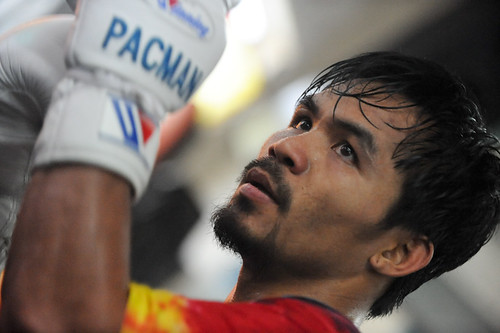As reported by Yahoo! Sports, boxing superstar Manny Pacquiao’s next fight will take place on November 24; however, for the first time since 2006, the fight will take place outside of the U.S. The official destination of this multimillion dollar sporting event is The Venetian in Macau, China.
As ATR reported in February, the possibility of Pacquiao’s next fight not taking place on U.S. soil due to a punitive federal income tax rate of 39.6 percent was greater than most would suspect.
As boxing promoter Bob Arum told Yahoo! Sports in February, “Manny can go back to Las Vegas and make $25 million, but how much of it will he end up with – $15 million?"
Clearly, the answer is less than what he stands to earn after taxes in Macau.
By holding his next fight in Macau, Pacquiao would only be responsible for a top marginal income tax rate of 12 percent – that’s a whopping 27.6 percent less than the U.S. top marginal federal income tax rate.
As ATR wrote in February:
Since Pacquiao is not a U.S. citizen or permanent resident, he can keep a larger percentage of his fight earnings by taking fights outside of the U.S. The other options Pacquiao and his management team have considered are Macau and Singapore: both casino and gaming markets comparable to Las Vegas and ideal to host a grand boxing event.
If Pacquiao were to earn a hypothetical $20 million for this upcoming fight in Macau, his after tax earnings would be $17.6 million – as opposed to the $12.1 million he would earn for the same proposed scenario in the U.S.
The loss of major athletic and sporting events will have economic repercussions on the American economy specifically tourism.
Fewer boxing matches per year would mean fewer vendors, a decrease in tourism, and less money being spent in host cities. Hosting a major sporting event has proven to create jobs and insert economic life within the city. The federal government needs to follow the examples being set by GOP governors seeking to reduce their respective state’s income tax burden or risk losing investments across every industry.
Pacquiao’s decision to fight in Macau will establish a trend among other non-resident boxers – or any athlete that is a non-resident of the U.S. for that matter – seeking to earn more money during their relatively short professional careers.
Simply put, tax rates matter to everyone regardless of earnings. In Pacquiao’s case, his chief advisor, Michael Koncz said it best, “…the 39.6 percent tax rate Pacquiao would face if he were to fight again in the U.S. makes a fall bout in Las Vegas "a no go."


